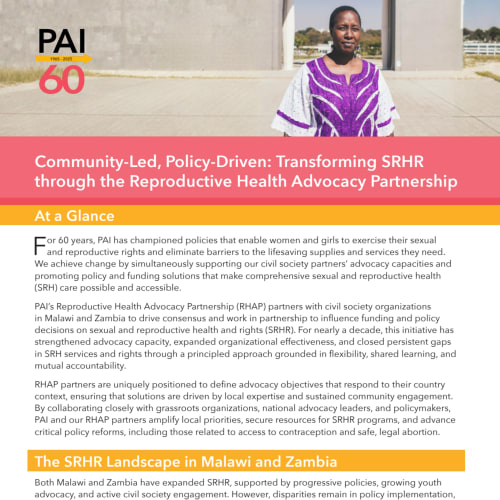Community-Led, Policy-Driven: Transforming SRHR through the Reproductive Health Advocacy Partnership (RHAP) at a Glance

The Reproductive Health Advocacy Partnership supports civil society organizations in Malawi and Zambia to influence funding and policy decisions on sexual and reproductive health and rights.
Our approach centers locally led advocacy driven by community perspectives; strategic litigation that enables all people to enjoy their rights as guaranteed by law; closing funding gaps for essential SRH services; and building institutional resilience of civil society organizations and enhances accountability mechanisms.
To date, the program has awarded more than USD$1.5M in funding to support civil society organizations and their advocacy and accountability priorities.
RHAP has awarded more than $1.5 million to support the advocacy work and organizational capacity strengthening of our partners.
Why It Matters
Nearly half of all pregnancies in Malawi and more than 40 percent of pregnancies in Zambia are unintended.1, 2 The burden of maternal mortality remains high in Malawi, with more than 300 women per 100,000 live births dying annually from preventable causes.3 Policy barriers further threaten progress toward universal access to family planning; contraceptive commodities; safe, legal abortion; and adolescent-friendly sexual and reproductive health services. PAI’s approach allows our partners to adapt quickly, innovate, and sustain advocacy that drives long-term change. By investing in local leadership and strengthening civil society capacity, we position communities to influence the policies that shape their health and futures.
Our Approach
Our Impact
Together with our partners we have:
Our Coalition Partners
Learn More
Contact us: info@pai.org
Sources:
Stay informed about the issues impacting sexual and reproductive health and rights.
